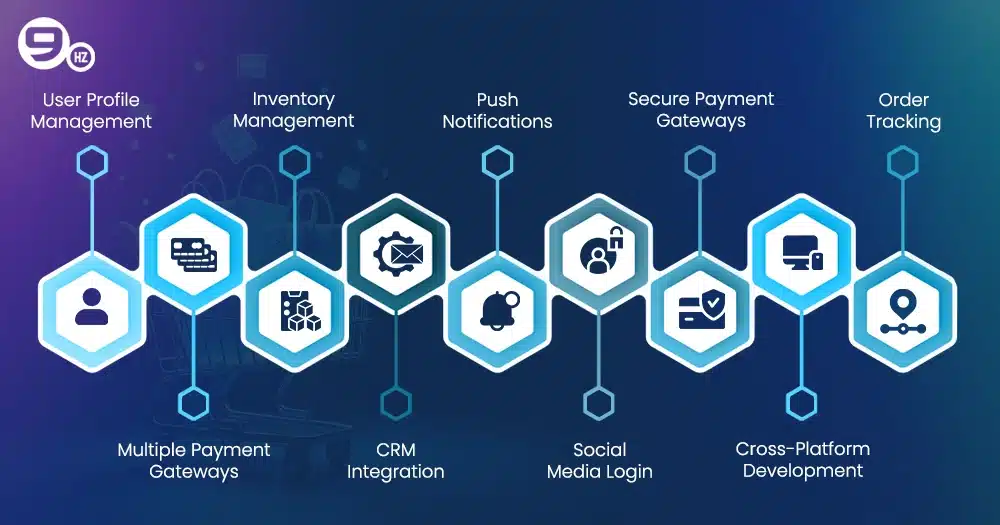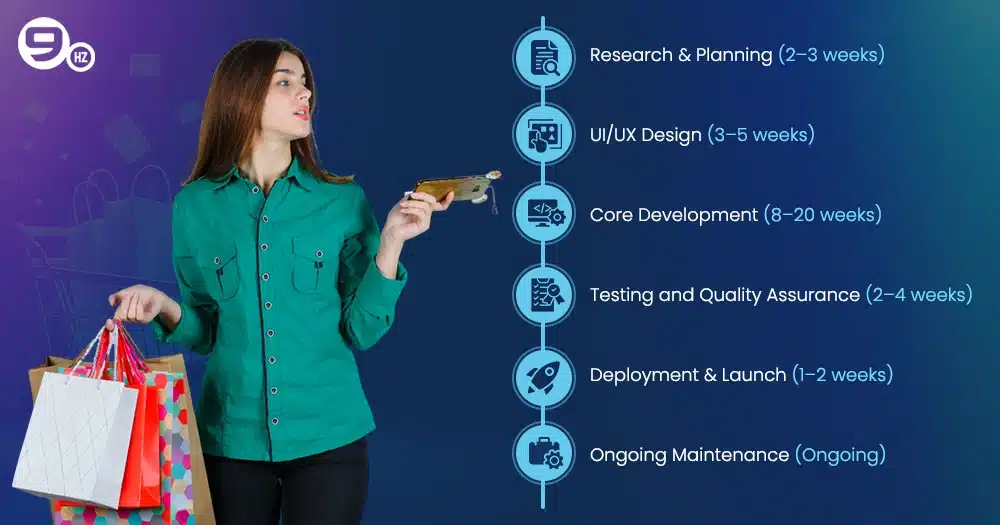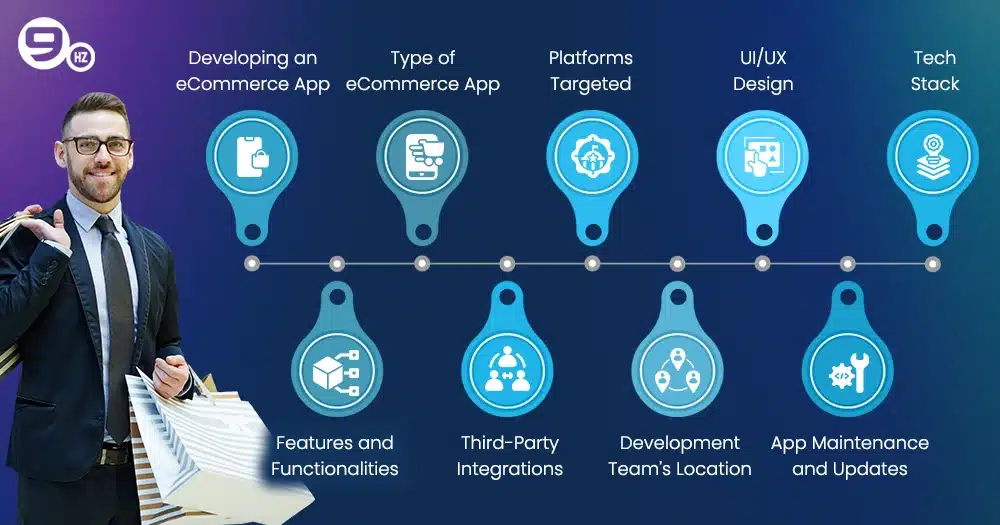Establishing a strong online presence is now very necessary in the fast-changing digital terrain of today. Businesses are spending more on ecommerce app development to profit from the expected $8 trillion worldwide industry by 2027.
The adoption of ecommerce mobile apps at the enterprise level shows very notable advantages. Over the previous three years, enterprises incorporating artificial intelligence into their e-commerce systems have, for example, had 1.5 times faster revenue growth, 1.6 times stronger shareholder returns, and 1.4 times higher return on investment. These developments highlight the transforming power of merging advanced features with ecommerce app development cost.
This all-inclusive tutorial explores the nuances of ecommerce app development, including ideas on strategic planning, cost breakdowns, and development schedules. Whether your dream is of a successful ecommerce app or a feature-rich ecommerce mobile application, knowing these components will enable you to make wise judgments and propel company development in the cutthroat global ecommerce market.
What is an eCommerce App?
An e-commerce app is a kind of application enabling consumers of products or services to make purchases on their mobile devices. These applications help users explore, add things to the basket, and finish transactions from anywhere, at any time: therefore, delivering a seamless shopping experience.
Businesses in many different sectors are using e-commerce applications to leverage the expanding online customer base, as mobile app development is evolving quickly. Investing in ecommerce app development can greatly increase your digital presence and user interaction, regardless of your line of business, whether that of a retailer or service provider. The main forms of e-commerce applications that companies are now using are below:
eCommerce app development services allows the businesses to shift to the online marketplace, explore audience, move beyond geograhical boundaries and multiply their revenue.
Types of eCommerce Apps
B2C (Business to Consumer)
Using a B2C e-commerce app lets companies directly market goods or services to specific consumers. For a seamless and safe mobile shopping experience, these applications provide speedy checkout, tailored suggestions, several payment options, and feature-rich, highly interactive capabilities.
- Direct selling to consumers
- Offers large product catalogues
- Includes different payment gateways
Example: Amazon, Walmart
B2B (Business to Business)
Apps for business-to-business e-commerce serve distributors and corporate customers. To streamline major operations and inventory control for suppliers and manufacturers, they enable bulk transactions, sophisticated pricing models, bespoke ordering, and connectivity with backend systems like ERP and CRM.
- Supports bulk ordering features
- Facilitates customer relationship management
- Integrates with inventory and ERP systems
Example: Alibaba, Udaan
C2C (Consumer to Consumer)
An individual-based C2C commerce software helps with transactions between people. Offering peer-to-peer commerce driven by trust-building elements like ratings, reviews, and dispute resolution, these platforms allow users to post items, negotiate prices, and finalize payments via secure payment gateways.
- User-generated product listings
- Ratings and review systems
- Encrypted payment gateways for buyer protection
Example: eBay, OLX
Must have Key Features of an eCommerce App
Making a superb e-commerce app requires including all the key elements that simplify, secure, and enjoyable buying. These fundamental components not only increase user engagement but also enable a more seamless operation of procedures and reduce the ecommerce app development cost of your shopping app. Your mobile e-commerce app ought to possess these characteristics:
1. User Profile Management
Users of this feature may quickly create accounts, manage them, and make changes to them. It is more tailored and retains your attention as it recalls your likes, purchases, and savings, as well as other aspects. Any e-commerce application that wants to retain users and have them returning must therefore effectively handle user profiles, as it also makes marketing and consumer tracking simpler.
2. Inventory Management
Good inventory control lets companies monitor their product line in real-time. This helps to regulate the supply chain and reduces errors. This function guarantees that, independent of the simplicity or complexity of the e-commerce software, items are accessible on multiple platforms. This fosters confidence and generally simplifies consumer buying.
3. Push Notifications
By informing consumers about promotions, new goods, or empty-filled baskets, push notifications are a terrific approach to keep them engaged. Strategic usage of them may significantly boost revenue and produce any e-commerce application. They also enable you to instantly interact with clients on their phones, therefore supporting your marketing initiatives.
4. Secure Payment Gateways
The development of an e-commerce software depends much on security. Knowing their financial data is secured and safe via safe payment methods helps users to buy with confidence. This feature is rather crucial for completing payments, keeping user data secure, and establishing confidence with consumers in a period when internet threats and data breaches are somewhat regular.
5. Order Tracking
From the moment they purchase, until they are delivered, users may monitor their goods. This helps consumers to be happy and clarifies things. Real-time updates, package information, and anticipated delivery timeframes are absolutely vital for any mobile e-commerce app. This makes purchasing simpler generally and saves consumers from having to ask questions.
6. Multiple Payment Gateways
If your shopping application allows users to pay in many ways—including wallets, net banking, credit or debit cards, and UPI—it will be more valuable. It guarantees that everyone may access it and supports a great spectrum of user preferences. This boosts sales and facilitates the expansion of your company on many platforms and spheres.
7. CRM Integration
Using customer relationship management (CRM) solutions together helps companies to better know their consumers. It simplifies sales, customer service, and marketing and helps you create customized offers. Including your CRM in your basic app development process also enables you to connect it with your company objectives, thereby supporting your retention of customers and expansion of your company.
8. Social Media Login
Social media login simplifies the sign-up procedure by letting users register via Google or Facebook. This helps users to have a more interesting and seamless training experience. It performs particularly well in e-commerce applications for young adults and teenagers who value instant access over conventional sign-up forms.
9. Cross-Platform Development
Should you decide on cross-platform development, your software will be compatible with iOS and Android. This will hasten delivery and cut the ecommerce app development costs. It is ideal for e-commerce companies that want to expand rapidly, as it reaches more people and operates the same on all devices.
Pro Tip: When you are creating an e-commerce app, rank these crucial elements first on your list to ensure it runs well, keeps consumers satisfied, and generates income.
Get a Custom eCommerce App Built to Scale
Hire Expert eCommerce App Developers Now
How Much Does It Cost to Develop an E-Commerce App in 2025?
For businesses wishing to go digital with their goods, ecommerce app development remains a major concern as we head into 2025. Whether you are creating a basic e-commerce software or a bespoke one with many capabilities, you must be aware of the cost to properly budget and make good use of your resources.
An e-commerce application’s typical cost in 2025 will range from $10,000 to $250,000, or sometimes more. Though applications are difficult, various platforms are utilized, development teams have varied degrees of ability, and consumers have different demands when it comes to functionality, hence prices vary greatly. Based on the kind of mobile app, let us consider a generic cost distribution:
| App Type | Estimated Cost |
|---|---|
| Basic eCommerce App | $10,000 – $30,000 |
| Mid-Level App | $30,000 – $100,000 |
| Advanced App | $100,000 – $250,000 |
| Custom App with AI/AR | $250,000+ |
Additional services that could increase the cost of development include integrating outside services, supporting many languages, secure payment methods, and constant maintenance. Companies also have to consider the less clear-cut expenses, including the fees to register an app on Apple App Store or Google Play, the fees for utilizing APIs, and the ongoing upgrades required to enable latest smartphones.
Pro Tip: Working with a reliable ecommerce app development company will enable you to better manage projects, control expenses, and guarantee quality at all levels of the development.
Thus, if you want to create an e-commerce app in 2025, you need to know what you are getting for that price in addition to considering the cost. Investing money in app development in a manner that suits your company objectives and customer demands will enable you to create a long-term return on investment e-commerce app that performs as expected.
How Long Does it Take to Develop an eCommerce App (With Cost Estimates)?
Just as crucial is knowing the length of time the ecommerce app development will take as it is in estimating its expenses. Your project’s planning, your approach to market, and your company’s ultimate growth all depend on the production time directly.
Regarding tech stack, feature set, and complexity, creating an e-commerce mobile app could take 3-9 months or more. Here is a detailed analysis of the estimated timescale and cost of every stage of app development:
| Development Phase | Time Required | Estimated Cost |
|---|---|---|
| Market Research & Planning | 2–3 weeks | $1,000 – $5,000 |
| UI/UX Design | 3–5 weeks | $2,000 – $10,000 |
| Frontend & Backend Dev | 8–20 weeks | $8,000 – $150,000+ |
| QA & Testing | 2–4 weeks | $1,500 – $8,000 |
| Deployment & Launch | 1–2 weeks | $500 – $3,000 |
| Ongoing Maintenance | Ongoing | $1,000 – $10,000/month |
Let’s Break It Down Further:
1. Research & Planning (2–3 weeks):
Before they create a single line of code, a smart ecommerce app development company will undertake extensive market, competitive, and user interest research. This stage prepares clever design and seamless procedures. Depending on the extent of the project and the degree of preparation, reaching this early stage generally costs between $1,000 and $5,000.
2. UI/UX Design (3–5 weeks):
Making shopping simple and involving consumers more depend on an interesting UI/UX. This stage creates wireframes, models, and user flows to guarantee the site’s simplicity of use. The design charge might range from $2,000 to $10,000 if you want unusual cartoons, drawings, or brand-related elements. Clearly, more detailed interfaces will increase the whole cost of creating an app.
3. Core Development (8–20 weeks):
Developing an e-commerce app takes the most time among all the aspects. It includes designing user interfaces for the front end, configuring rules for the rear end, linking many payment gateways, ensuring that every payment channel is secure, and ensuring that the site runs on all platforms. This stage of development may be anything from $8,000 to $150,000 or more, depending on the complexity of the app and the particular advanced features required.
4. Testing and Quality Assurance (2–4 weeks):
It matters not how wonderful your app is; it must be completely tested for speed, safety, and simplicity of use. Load testing, issue tracking, and ensuring that every mobile device can interact with the app constitute part of this as well. Usually at this point, development expenses run between $1,500 to $8,000. This is done to ensure that before it launches your ecommerce mobile app runs flawlessly.
5. Deployment & Launch (1–2 weeks):
You must follow certain guidelines, set up data, and monitor many versions if you want your mobile e-commerce app to be included in the App Store and Google Play. Additionally, put up by your developers are third-party services such as analytics and crash monitoring. Depending on how many platforms are utilized and how complex the app store rules are, this step runs from $500 to $3,000.
6. Ongoing Maintenance (Ongoing):
Your app must be constantly updated, problem corrected, and swiftly improved even after it has been launched if you want to remain competitive in the fast-paced e-commerce sector. New features and customizing depending on user preferences are also part of maintenance. Maintenance might be anywhere from $1,000 to $10,000 a month, or 15 to 20 percent of the initial app building expenses.
Pro Tip: Regular app maintenance and scalable design investments will help to keep your app secure and capable long after it is launched. Given the fast changing global e-commerce business, this is extremely critical.
What Are the Key Factors that Influence the Cost of Developing an eCommerce App?
Before starting the general ecommerce app development, one should be aware of the motivations behind it. Making a flexible, high-performance e-commerce mobile app’s cost relies on many crucial elements like the platform used and code complexity. Knowing these items will enable you to avoid expensive errors and improve your purchasing decisions.
1. Type of eCommerce App
The kind of e-commerce software you choose will greatly affect the running expenses of your project. Whether you’re establishing an MVP or a full-fledged platform will affect your time, money, and tools.
- Basic eCommerce App: Contains basic elements like a checkout page, shopping cart, and product list. Perfect for startups wishing to test their concepts.
- Complex Apps: Real-time data, many payment options, and AI-made recommendations are among its innovative tools.
2. Platforms Targeted
Your mobile e-commerce app may function with either Android or iOS, or both. Though it costs more, using more than one site increases your reach. Conversely, multi-platform development strikes a balance between speed and market reach by reducing development time and expenses, therefore negating their impact.
3. UI/UX Design
The engagement and happiness of users directly depend on design. While adding original photos, animations, and little interactions can increase the cost of creating the app, a clean, simple interface makes purchasing more seamless. The long-term expansion of an app depends on funding user-centered design.
4. Tech Stack
The tools, languages, and libraries an app makes use of influence not just its functionality but also its simplicity of expansion. Although complex stacks load quicker and are safer, they often cost more to design and need your development staff to possess certain expertise.
5. Features and Functionalities
Every fresh feature you add—such as inventory control, secure payment options, or push alerts—increases the overall cost of development. Though necessary, premium or custom development options like AR try-ons or robots add a lot of value and money. The following are some key elements influencing pricing:
- User registration and login
- Inventory management
- Encrypted payment gateways
- Push notifications
- Order tracking
- Chat support
- Multiple payment gateways
- Hosting fees
- API costs
- App Store / Google Play fees
- Ongoing support
6. Third-Party Integrations
Often improving your e-commerce mobile app requires adding other services such as CRM systems, tracking tools, or email platforms. These features increase the value of the software but also make it more costly to create and more effort to maintain operating.
7. Development Team’s Location
The budget might be greatly affected by the location of your mobile app development company. Teams in Asia could charge $20–$60/hour; teams in North America would charge $100–$250/hour. A good balance between cost and quality may be obtained by careful outsourcing. Where you reside determines your rate:
| Region | Hourly Rate |
|---|---|
| North America | $100 – $250/hour |
| Eastern Europe | $30 – $80/hour |
| Asia | $20 – $60/hour |
8. App Maintenance and Updates
Your e-commerce mobile app will require constant updates once it’s out there to repair issues and add fresh features. Usually costing 15–20% of the original development budget annually, this continuous maintenance is essential to ensure long-term performance and the capacity for change in the increasingly competitive online business.
What Are the Most Important Budgeting Tips for eCommerce App Development?
Making a reasonable budget for your project on e-commerce app development will help you to ensure that the launch goes well and that you do not exceed budget. Many companies lack the necessary planning or understanding of the full development process; hence, they are unsure about the expenses involved. Your final pricing is influenced by every decision you make, including platform to highlight.
If you have clever ideas and a well-defined strategy, you may create a high-performance shopping mobile app, minimizing expenses by a significant degree. Whether you are beginning with a basic e-commerce app or investing a lot of money in a more complex app, these smart planning ideas will let you maximize your money and get the most out of your mobile app development.
1. Define Your Goals Clearly
Before you begin to build, establish your company objectives, target group, and main performance measures. If you know exactly what you want, you may choose the correct e-commerce app development company and prevent scope creep. Using a targeted approach helps you to ensure that your investment supports your primary business concept and reduces the expenses of creating an app.
Start with an MVP
Making a Minimum Viable Product (MVP) is a low-cost approach to getting your mobile e-commerce software operational. It only contains the qualities early purchasers need, so you may try the goods before making a purchase on a particular development. This approach gathers comments from actual users for further improvements and reduces the first development expenses.
Choose the Right Development Partner
Working with a mobile app development company with a lot of expertise ensures openness and quality all through the process. Having a competent workforce helps you avoid substandard work, cost overruns, and delays. Make sure the developers you choose provide solutions that can be extended, clear contracts, and continuous support so you can maintain your app current and enable its expansion.
Prioritize Features Strategically
Not every feature needs to be unveiled with the first release. Pay close attention to elements that directly influence user engagement and conversion: secure payment methods, push messaging and inventory control. Later on adding more advanced features will assist to maintain the cost of your initial app reasonable as part of your expansion strategy.
Account for Hidden and Long-Term Costs
Apart from the production expenses, you need to consider servers, outside services, advertising, App Store or Google Play fees, and continuous maintenance. These hidden expenses are simple for one to accumulate. Making a reasonable budget with both short- and long-term objectives for your money can help you prevent negative surprises in the future. These are some hidden expenses:
Why Choose The NineHertz for eCommerce App Development?
Choosing the correct partner might make all the difference between a basic response and a potent development engine if you want to create an online store. Using modern technology and a thorough understanding of the ecommerce industry, The NineHertz develops unique, functionally sound mobile e-commerce applications.
Whether you are launching a basic ecommerce app or a high-traffic e-commerce mobile app, our expertise guarantees that the process from concept to release proceeds without a hitch and yields outcomes. Being a globally recognized mobile app development firm, we provide companies with tailored digital solutions and future-ready development tools to help them expand.
Why We Stand Out
1. 15+ Years of Industry Experience
Since they have been creating mobile applications for over 15 years, NineHertz can provide your project with proven expertise and skill set. We create items that satisfy consumer demands as well as those of the market, and know what e-commerce companies need.
2. Custom Development Solutions
One size fits all is not something we believe to exist. Our staff can completely personalize the building of any electronic commerce software, therefore, your platform will have all the tools and capabilities your company needs to be successful on all platforms.
3. Agile Development
Our agile development approach allows us more flexibility, quicker output, and improved capacity to adapt to project demands. Clear objectives, feedback loops, and Sprints enable us to better manage the time and money required to create an app.
4. Expert & Professional Developers
At NineHertz, a top-notch development team of server engineers and UI/UX designers works on your project. Their only concern is ensuring your e-commerce applications are quick, scalable, and secure.
5. Scalable Architecture
It doesn’t matter whether you are launching a new company or growing an existing one, our applications are designed to grow with your company. From handling products to user profiles, everything is set up to run optimally for speed, traffic, and future developments.
6. Cross-Platform Development
Why confine yourself to one set of people? Cross-platform app development is rather strong in our team, so they can create applications that run flawlessly on iOS and Android. This helps you reach more people and lowers the building expenses.
7. Integration with Third-Party Services
Third-party providers, including CRMs, marketing automation, several payment options, and transportation APIs, may easily interface with your app. This smooths out operations and enhances user experience.
8. Focus on Secure Payment Processing
Negotiation is not security. Using safe payment methods, encrypted transactions, and fraud detection systems, our developers ensure sure user data is protected in every mobile app we create.
9. End-to-End Maintenance & Support
Starting does not mark the end of our friendship. We provide continuous support, frequent upgrades, bug repairs, and application maintenance as your company expands to ensure that your ecommerce app is secure and performs as intended.
10. Proven Client Success
From startups to Fortune 500 firms, many enterprises—from all walks of life—have found The NineHertz to be invaluable in guiding their ecommerce application development. Our portfolio demonstrates how our bespoke e-commerce applications have enabled companies to become more involved with their customers and accelerate their growth.
Conclusion
At last, the cost of developing an ecommerce app in 2025 will rely on several key factors like the features, platform, technological stack, and degree of developer talent. From planning and design to deployment and ongoing maintenance, every stage of the process influences the cost of developing an app. If companies properly budget and follow the correct strategy, they may create a shopping mobile app that fits them and expand as necessary.
To create a fantastic ecommerce app that performs well on many devices, The Nine Hertz is ultimately the finest place to start. Being a top-rated e-commerce app development company, we can assist you with your digital transformation by creating original, secure, reasonably priced mobile applications. Contact us immediately to convert your company concept into an ecommerce app with high sales capability.
FAQS
1. What is the timeline for eCommerce app development?
The features, level of complexity, and platform used define the time required to create an e-ommerce app. Making a basic ecommerce app takes less time than creating a sophisticated one with cross-device development and special qualities. This is thus resulting from the phases of extensive app operation and testing.
2. How do you develop an eCommerce app on a low budget?
Start with a basic MVP with only the most crucial functionality to help keep app development expenses down. Multi-platform development helps you save money and time. See a low-cost ecommerce app developer like The NineHertz to ensure you get reasonably priced, high-quality work without breaking the budget. They provide scalable, safe developmental tools.
3. Why should I develop an eCommerce app for my business?
An e-commerce mobile app increases sales, makes your business more easily discoverable, and keeps consumers more engaged. It enables companies to flourish in the fast expanding e-commerce sector of the global economy. If you create your ecommerce app properly, you will be able to satisfy the expectations of consumers who are digital first and provide a seamless purchasing experience.
4. What are the essential features of an eCommerce app?
Managing user accounts and items, delivering push notifications, taking secure payments, and tracking orders are some of the most critical aspects of an e-commerce platform. These tools simplify payment procedure, maintain user attention, and enable shopping on smartphones across many platforms, free from any difficulties.
5. How do I ensure the security of my eCommerce app?
You can keep your data safe by means of secure payment methods, data protection, two-factor login, and consistent updates. Choose a respected application development firm such as The NineHertz. Using best practices for e-commerce app development, they provide legal, secure payment processing and protect user data.
6. What is the ecommerce app development cost?
By $50,000, $250,000 or more, different features, platforms, tech stacks, and the location of the development team might alter the price of creating an ecommerce app. Custom features, outside services, and continuous maintenance in major terms also influence the whole cost of development.
7. Can I integrate my existing website with my new eCommerce app?
Yes, it is possible to link your e-commerce website to a brand-new mobile ecommerce app entirely. This permits real-time syncing of supply, sales, payment methods, and tools. NineHertz provides unique connectivity solutions to maintain consistency in online and mobile applications and enhance user experience.
Great Together!












